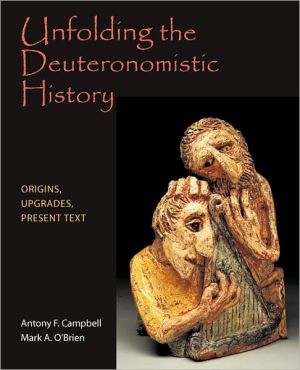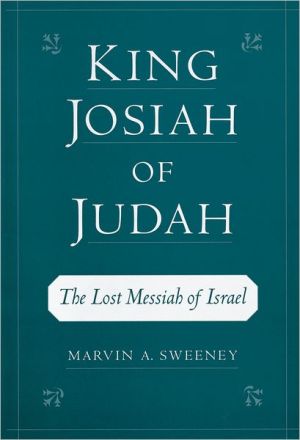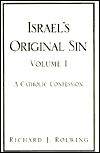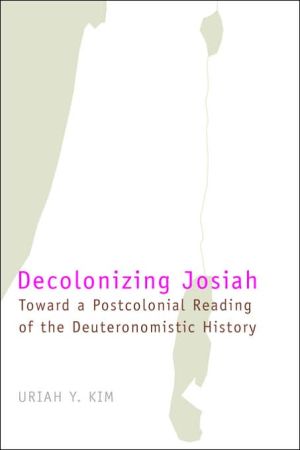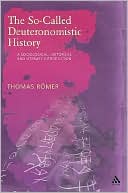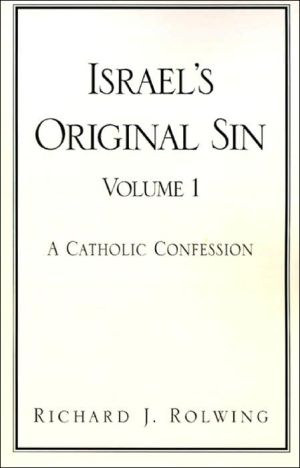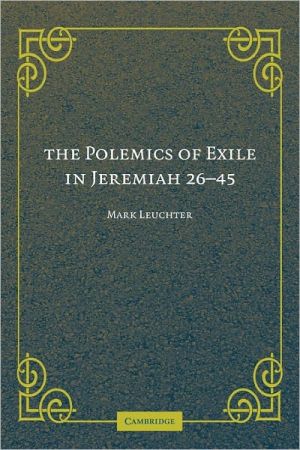Unfolding The Deuteronomistic History
"In Unfolding the Deuteronomistic History Campbell and O'Brien have provided a useful tool for getting at the debate over the composition of the Deuteronomistic History, without neglecting the outlook and theology of the work as a whole. Each page is packed with information that is, nevertheless, readily accessible. The formatting of the biblical text allows the reader to see at once the layers that the authors reconstruct, and their annotations clearly explain the reasons for their...
Search in google:
"In Unfolding the Deuteronomistic History Campbell and O'Brien have provided a useful tool for getting at the debate over the composition of the Deuteronomistic History, without neglecting the outlook and theology of the work as a whole. Each page is packed with information that is, nevertheless, readily accessible. The formatting of the biblical text allows the reader to see at once the layers that the authors reconstruct, and their annotations clearly explain the reasons for their judgments. This is the place to begin the study of any passage in the Deuteronomistic History."-Steven L. McKenzie, Rhodes College Author of The Trouble with Kings"Antony F. Campbell and Mark O'Brien's monumental work represents critical thought at its best. Written in a style that is thoroughly imaginative and engaging without sacrificing the erudition of great scholarship, this work is not only researched meticulously but also offers a new approach to reading and understanding the Deuteronomistic History. This study challenges traditional methods and findings of historical criticism while attempting to be faithful to the text at hand in relation to making sense out of the present text. Comprehensive yet selective introductions to the books of Deuteronomy through 2 Kings set the stage for a thorough analysis of each book of the deuteronomistic historical books. Offering a major contribution to the biblical field, Campbell and O'Brien's work is sure to become a classic that will inform all future work to be done in this area."-Carol J. Dempsey, University of Portland Author of The Prophets (Fortress Press, 2000)Antony F. Campbell, S.J., is Professor of Old Testament at JesuitTheological College, Melbourne, Australia. He is author of numerous works including A Study Companion to Old Testament Literature (2nd ed., 1993).Mark A. O'Brien, O.P., is Professor of Old Testament at Yarra Theological Union, Melbourne, Australia, and the author of The Deuteronomistic History Hypothesis (1989).
From the Introduction (pre-publication version):\ General\ Unfolding the Deuteronomistic History makes an approach to the thinking, insights, and information of critical scholarship in the area visually accessible to the interested reader of the biblical text. \ \ The book provides annotations to identify the text signals (signals embedded in the text) on which these insights are based. Most annotations include reflection on the text-history approach which seeks to account for these signals by development within the text and most provide reflections as to how the present-text potential may be exploited in all fidelity to the text to fuel imagination in its use. \ \ Two principles have important implications for the task of analysis. First, one of those self-evident truths which Martin Noth put into words (if not always into practice): because a critical operation is possible does not make it necessary; possibility does not engender necessity. Second, involving reversal of a long-standing scholarly prejudice and emerging from modern acceptance of the skill and intelligence of biblical editors: when an editorial adjustment to the text is identified, interpreters need to explain the value added by such an adjustment; additions require reasons. Alert to the evident ability of ancient editors, critical analysis will be less likely to fragment biblical text and more likely to reveal the value added in the history of the text. \ \ Our interest is not in the very beginnings of traditions but in the coherent texts that have been woven from these beginnings and that have become the source texts for the great narratives of Israel's scriptures. Many works ofhistorical-critical scholarship were interested in such beginnings; this work is not. We can no longer continue the work of the past two centuries as if unlimited vistas of similar opportunity stretched before us-they do not. We cannot honestly return to the innocence of pre-critical study-although some seem to try. We need to continue exploring the many ways of hearing and reading the biblical text both honestly and post-critically, exercising and stretching our cultural imaginations. \ \ The Deuteronomistic History\ The biblical books of Deuteronomy through Second Kings tell a version of Israel's story as an independent nation, from the plains of Moab on the desert fringe just across the Jordan to the exile in Babylon on the far side of the same great desert. The Deuteronomistic History, the story told within these books, is one of the three major narrative texts of Israel's past. Says Martin Noth: "These great compilations are the Pentateuch and the historical works of the Deuteronomist and of the Chronicler." He goes on: "the Deuteronomist's work ... must first be 'discovered' as a literary entity and unity. ... We must take the preliminary step of determining its contents, distributed as they are throughout a series of Old Testament books'." It was Noth who, in 1943, first identified this work as "a literary entity and unity." He located it in the time of Israel's exile, the work of a single individual. \ \ According to Noth, the history was probably the independent project of a man whom the historical catastrophes he witnessed had inspired with curiosity about the meaning of what had happened, and who tried to answer this question in a comprehensive and self-contained historical account, using those traditions concerning the history of his people to which he had access. \ \ The vision of Noth's work went largely unaltered for a quarter of a century. 1968 saw the beginning of a series of studies that has modified how these Israelite texts are understood. Disappointment with the so-called "historical-critical" study of the Bible and a turning away from approaches found unfruitful and sterile-perhaps, too, a broader malaise-have kept these investigations from generating widespread excitement in biblical fields. Among other factors, attraction to literary approaches diverted energy away from what came to be seen as hair-splitting and verse-splitting techniques. The scholarly energy invested in these studies since 1968 is not unlike the quest for ore-bearing lode in the gold-rush days; unlike those days, the excitement of the old-timers has not been felt on a wider scale. \ \ All of which is a pity, for if the outcome is more complex than the simplicity of Noth's individual thinker in the time of Israel's exile, it is certainly richer. The content canvassed is wide. On the overall level, there is both hope and despair; the hope engendered by the promise of reform and the despair that follows when reform is abandoned and political disaster ensues. On the level of the stages of Israel's story (or of its biblical books), there is again a wide canvas: Israel's relationship with its God (Deuteronomy); its occupation of the land (Joshua); its life before kings (Judges); the emergence and establishment of its monarchy (Samuel); and the decline and fall of that monarchy (Kings). \ \ Multiple theological views are expressed within these ancient biblical texts themselves. They hold an ore that is rich and revealing. Deuteronomy is far from a mere lawcode and a potted history of the desert time; there is also what it means to be chosen people, a people loved and a law to be kept, the interplay of divine empowerment and human responsibility. Joshua is no simple story of conquest and allotment; above all, there is the tension between "you will fight for it, with the LORD's help" and "the LORD will fight for it on your behalf, with your help." Judges is no model time of dependence on a protective God; there is God's punishment of Israel's sin, and along with deliverance there is also deterioration. Samuel has all the complexity of the human political situation, and through it the thread traced of God's will; there are prophets for divine guidance and kings for political leadership. The books of Kings should be Israel's high point, but if they were it would be untrue to Israel's experience; fidelity to God, and all that God means, was wanting-so human failure, foreshadowed in Solomon's apostasy, gradually became reality, first in the exile of the north, finally in the exile of the south. \ Author Bio: Antony F. Campbell, S.J., is Professor of Old Testament at Jesuit Theological College, Melbourne, Australia. He is author of numerous works including A Study Companion to Old Testament Literature (2nd ed.; 1992).\ Author Bio: Mark A. O'Brien, O.P., is Professor of Old Testament at Mannix College, Clayton, Australia, and the author of The Deuteronomistic History Hypothesis (1989). Together, Campbell and O'Brien authored Sources of the Pentateuch (Fortress Press, 1992).
Introduction General Components -Present text and revised DH -Josianic DH -Its sources, including: --Conquest Narrative --Deliverance Collection --Prophetic Record --PR Extension --HKL -Technical Deuteronomy Joshua Judges 1 Samuel 2 Samuel 1 Kings 2 Kings Bibliography
